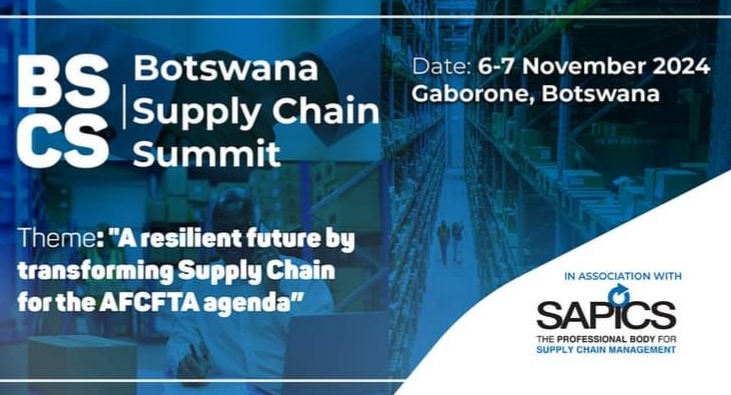The Botswana Supply Chain Summit, scheduled for November 6-7, is set to be a groundbreaking event focusing on reshaping supply chain practices across Africa. With an emphasis on building resilient, future-ready systems, the summit will bring together leaders, experts, and innovators to discuss how emerging technologies like blockchain, the Internet of Things (IoT), and Artificial Intelligence (AI) are revolutionizing supply chain operations on the continent.
Enhancing Supply Chains with Emerging Technologies
Africa’s supply chains face unique challenges, from inadequate infrastructure to inefficiencies in logistics and distribution networks. The adoption of advanced technologies promises to address these issues while boosting the continent’s competitiveness in the global market. By integrating blockchain, IoT, and AI, African businesses can streamline operations, ensure better traceability, and reduce costs, paving the way for more robust and future-ready supply chains.
Blockchain offers a transparent and secure way to track goods as they move through the supply chain, reducing fraud, counterfeiting, and theft. In sectors such as agriculture, where Africa is a major player, blockchain could be used to verify the authenticity and quality of products, ensuring that businesses comply with international standards and reducing the risk of lost or misrepresented goods.
The Internet of Things (IoT) enables real-time monitoring of assets, helping supply chain managers track shipments, monitor inventory levels, and predict demand more accurately. In Africa, where logistics can be complicated by infrastructure gaps, IoT can help companies optimize their operations, improve inventory management, and reduce waste, all while increasing operational efficiency.
Artificial Intelligence (AI) can predict supply chain disruptions, optimize routes, and automate processes that would otherwise be manual, such as demand forecasting. With AI, African businesses can better anticipate market shifts and adjust their strategies in real time, helping to overcome challenges related to volatile markets and unpredictable demand.
Supporting the AFCFTA Objectives
The African Continental Free Trade Area (AFCFTA), which aims to create a single continental market for goods and services, is an ambitious initiative to boost intra-African trade and economic integration. However, realizing the goals of AFCFTA requires overcoming significant barriers in supply chain management, including inefficient border processes, inadequate infrastructure, and a lack of standardization across countries.
Technologies like blockchain, IoT, and AI are critical to advancing AFCFTA’s objectives. By enhancing transparency, communication, and collaboration across borders, these technologies can help smooth cross-border trade, reduce customs delays, and standardize processes across different regions. For example, blockchain could be used to authenticate trade documents, streamlining the approval process at customs and reducing the time it takes to clear goods across borders. IoT could improve inter-country logistics by offering real-time data on shipments, making it easier to manage goods as they move between nations with varying regulations and infrastructure.
Furthermore, AI’s predictive capabilities could help businesses adjust their supply chain strategies to the changing demands of the AFCFTA market. By analyzing patterns, AI can provide insights into the most efficient routes, optimal pricing, and demand fluctuations, empowering businesses to capitalize on new opportunities within the continental market.
Addressing African Supply Chain Challenges
African supply chains are often burdened by issues such as fragmented networks, outdated systems, and insufficient investment in infrastructure. These challenges are exacerbated by rapid population growth, a diverse range of industries, and varying regional policies. However, the integration of emerging technologies offers a unique solution to many of these issues.
Blockchain’s decentralized nature ensures that data is secure and immutable, a vital feature in areas prone to corruption or fraud. IoT sensors can provide data on everything from road conditions to vehicle performance, helping businesses avoid costly disruptions. AI, by processing vast amounts of data, can make predictions that help businesses reduce inventory levels, eliminate bottlenecks, and enhance overall decision-making processes.
Incorporating these technologies into African supply chains could also stimulate innovation and create new job opportunities across the continent. As businesses embrace digital transformation, the demand for skilled workers in technology, data analysis, and logistics management will rise, fostering economic growth and skills development in local communities.
The Botswana Supply Chain Summit is an important step in reshaping the future of supply chains in Africa. By exploring the potential of blockchain, IoT, and AI, the event will highlight how these technologies can help African businesses address the continent’s supply chain challenges and support the goals of the AFCFTA. As Africa positions itself as a competitive player in global trade, the adoption of these technologies will be essential to ensuring that supply chains are resilient, efficient, and ready to meet the demands of the future.










